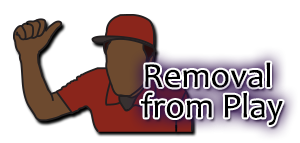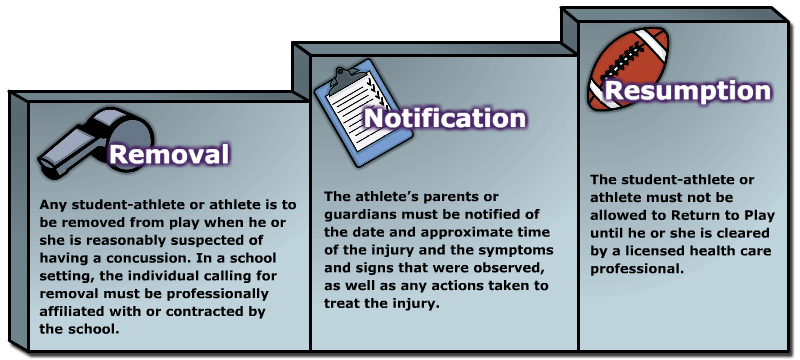Removal from Play
 |
Removal from Play is taking a young athlete out of the game when a concussion is suspected until evaluated by a licensed health care professional. It also means keeping the young person out of risky activities during treatment and recovery, not just the activity he or she was taking part in when the injury took place.
Unlike many colleges and universities, schools and club sports programs may lack protocols and armies of athletic trainers and medical professionals to help determine when a youth needs to be removed from play. It may fall to you, as a licensed health care professional, to help prevent young athletes from going back in after sustaining a concussion. Young people in your care will need your assistance to help manage their concussion symptoms. |
Removal from Play and Return to Play
Why Licensed Health Care Professionals Need to Make the Call
|
|
REMOVAL FROM PLAY is an important component |

|
Surveys of athletic directors conducted by the Nebraska Department of Health and Human Services have been conducted in 2013, 2015, 2and 2017. The most recent survey found: The State of Nebraska has completed 3 surveys of concussion practices in the state. The most recent survey (2017), found that
Nebraska law also requires that athletes suspected of experiencing a concussion be removed from play until cleared to return:
Athletes must receive signed clearance from a licensed health care professional:
Nebraska high schools must have a formal return to learn protocol in place for not only concussed athletes, but also concussed non-athlete students. Overall, 84% of respondents indicated that their school had a return to learn policy in place. There were improvements form 2013 and 2015:
One finding of concern was the number of parents and coaches who were reported to make return to play decisions. This appears to be illegalby the law, and is very poor practice given the subjectivity and inherent conflicts of interest involved. While rural schools have significant resource challenges, it is imperative that schools partner with professionals, develop consultative models and bring licensed health care professionals into the required procedures. |
